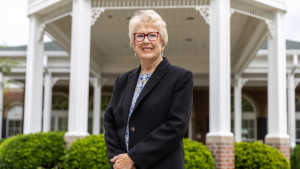Education on under-prescribed drug helps reduce cravings for those with alcohol use disorder, MU SSON study finds
MU SSON researcher examines impact of intervention to help people struggling with one of the most common psychiatric conditions.
June 13, 2023
Not only is alcohol one of the world’s most abused drugs, but alcohol-related deaths trail only tobacco, poor diet and physical activity, and illegal drugs as the leading cause of preventable deaths in the United States.
To assist people trying to recover from alcohol use disorder, Jason Ipsarides conducted a study as a doctoral student at the University of Missouri’s Sinclair School of Nursing. The study helped raise awareness about the benefits of naltrexone, an opioid antagonist that blocks the receptors in the brain associated with the reinforcement of addictive behaviors, such as alcohol use disorder and opioid use disorder. By blocking those receptors, the FDA-approved drug results in reduced cravings, which ultimately helps patients on their path to recovery.
He found that providing educational information about naltrexone to health care professionals who help recovering alcoholics at a detox facility resulted in an increase in patient prescriptions for the drug.
In the study, which was conducted at an inpatient psychiatric facility for recovering alcoholics in Wisconsin as part of his doctoral coursework at MU, Ipsarides compared an initial control group, whose health care professionals were not provided any educational information about naltrexone, to an intervention group whose health care professionals were provided educational information about the benefits of naltrexone.
What he discovered is about 36% of patients in the initial control group and about 40% of patients in the intervention group left the facility with a prescription for naltrexone — a finding that suggests the educational information Ipsarides provided to the health care professionals helped them make better-informed decisions regarding how best to support their patients on the road to recovery.
“Many people might not realize that not only is alcohol use disorder extremely difficult to recover from, but alcohol is also the only drug in the world where you can actually die from the withdrawal effects if you are a long-time heavy user and try to stop drinking, as the withdrawals can cause seizures and other health issues,” Ipsarides said. “What sparked my interest in this research is we kept seeing the same people come back to our detox facility who had relapsed, so I wanted to find evidence-based solutions that can help people on the road to recovery. It may not be the only solution, but it is a step in the right direction.”
Ipsarides added that alcohol use disorder contributes to millions of deaths worldwide, including from drunk driving, long-term health consequences and alcohol-related injuries and accidents. In addition to damaging family relationships, alcohol use disorder is incredibly costly to the already overburdened American health care system.
“Hopefully health care professionals, nurses, social workers and psychiatrists can benefit from this research,” Ipsarides said. “By providing more information about beneficial treatment options, we can help those in recovery make better-informed decisions.”
“Education intervention to increase naltrexone use among adult inpatients with alcohol use disorder” was recently published in the Journal of Psychosocial Nursing.
This article was originally published by Show Me Mizzou on June 12, 2023.


